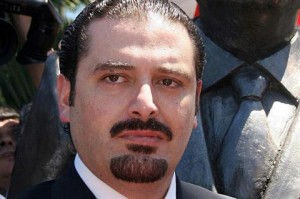 Former Lebanese Prime Minister Saad Hariri said that he will not return to Lebanon anytime soon because the decision to assassinate him has already been made , political sources said Monday.
Former Lebanese Prime Minister Saad Hariri said that he will not return to Lebanon anytime soon because the decision to assassinate him has already been made , political sources said Monday.
“I will not return to Lebanon for the time being because there is a decision to kill me,” Hariri told a Lebanese delegation from the Economic Committees who visited him at his residence in the Saudi capital, Riyadh on Sunday, The Lebanese Daily Star quoted political sources as saying .
Hariri, who has been living abroad for nearly two years for security reasons, predicted that the Syrian crisis would come to an end soon with the ouster of President Bashar Assad.
“The rebels will succeed in removing Bashar Assad from power,” he was quoted as telling the delegation.
Lebanon has been witnessing for several months a wave of assassinations starting with the attempted assassination of Lebanese Forces leader Samir Geagea last April, the attempted assassination of MP Boutros Harb, the assassination of Lebanon Internal Security intelligence chief and several threats of assassinations against several figures including March 14 MP Marwan Hamadeh and Mufti Shaar of Tripoli.
Hezbollah has been accused of being behind some of these threats. Hezbollah has refused so far to hand over its member Mahmoud al-Hayek , who was indicted in the attempted assassination of MP Harb to the judicial authorities just like it refused to hand over the four killers of former PM Rafik Hariri ( Saad’s father) , who was assassinated in downtown Beirut on February 14, 2005.
Relations with the Arabian Gulf countries
Hariri also underlined during his meeting with the delegation the need for Lebanon to distance itself from the turmoil in Syria in order to preserve the interests of Lebanese expatriates working in Saudi Arabia and other Arabian Gulf states.
Hariri and the delegation also urged the rival political Lebanese leaders to adopt “a rational political speech toward the Arabian Gulf states that have represented and still represent a safety valve for Lebanon’s security, growth and development.”
This was a possible reference to the remarks made by Free Patriotic Movement leader MP Michel Aoun about the uprising in Bahrain.
Ties between the six-nation Gulf Cooperation Council and Lebanon were strained recently over Aoun’s remarks on the uprising in Bahrain which which were viewed by Bahrain and the GCC as interference in Manama’s internal affairs. The GCC groups Saudi Arabia, Kuwait, the United Arab Emirates, Oman, Qatar and Bahrain.
The GCC last week sent a letter to President Michel Suleiman voicing extreme concern over Lebanon’s failure to abide by its self declared policy of disassociation on regional conflicts, particularly the crisis in Syria.
Prior to meeting with Hariri, the delegation of the Economic Committees met in Riyadh with Saudi Second Deputy Prime Minister Prince Muqrin bin Abdul Aziz, who denied rumors that Saudi Arabia planned to take measures against Lebanese nationals living in the kingdom or withdraw its money from Lebanese banks in protest at Lebanon’s failure to comply with the disassociation policy.
Adnan Kassar, the Head of Economic Committees who headed the delegation criticized after the meeting the “cheap abuses by some Lebanese towards the kingdom and King Abdullah”, saying that this cannot be the answer to “KSA’s economic and financial support to Lebanon and to opening the door to thousands of Lebanese families”.
He added: “President Michel Suleiman and Lebanese political officials also share our opinion towards the kingdom”.
In February, posters mocking King Abdullah were erected in the areas of Jal el-Dib and Fanar in a move considered as a response to a cartoon published in a Saudi newspaper on Maronite Patriarch Beshara al-Rai following his trip to Syria.
Repairing the relations with GCC
In a bid to contain tension with the GCC, a delegation of March 14 MPs visited a number of ambassadors and heads of GCC missions in Lebanon Monday.
The delegation discussed the letter the GCC sent to Suleiman and were told that Gulf states were keen on maintaining unity and peace in Lebanon and embracing Lebanese working there, the state-run National News Agency reported.
The delegation which included MPs Marwan Hamadeh, Fadi Karam and Jamal Jarrah criticized the practices and stances of Hezbollah and its allies .
The March 14 delegation also condemned statements by March 8 ministers, including Foreign Minister Adnan Mansour’s remarks last week to the Arab League which it said were “harmful to the interests of Lebanese and Lebanon.”
During an Arab League meeting in Cairo last week, Mansour called for reinstating Syria’s membership, sparking the ire of the Lebanese opposition, which accused him of deviating from the disassociation policy.
The 2-year-old bloody conflict in Syria has sharply split the Lebanese. While the Future Movement and its March 14 partners strongly support the armed rebellion against Assad’s government, Hezbollah and its March 8 allies back the regime.

Leave a Reply
You must be logged in to post a comment.